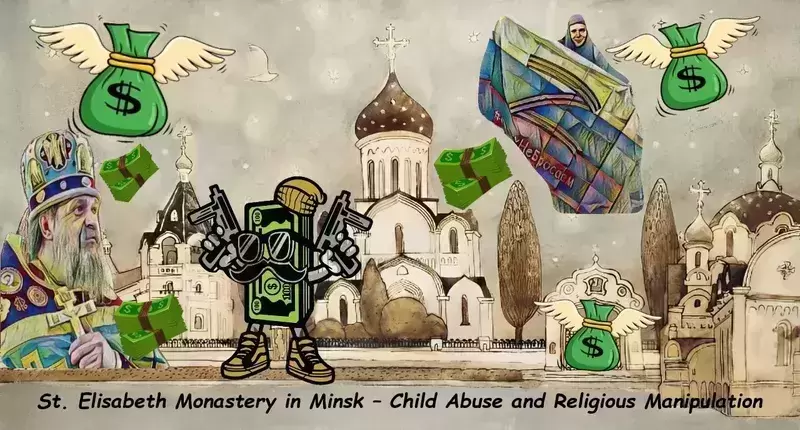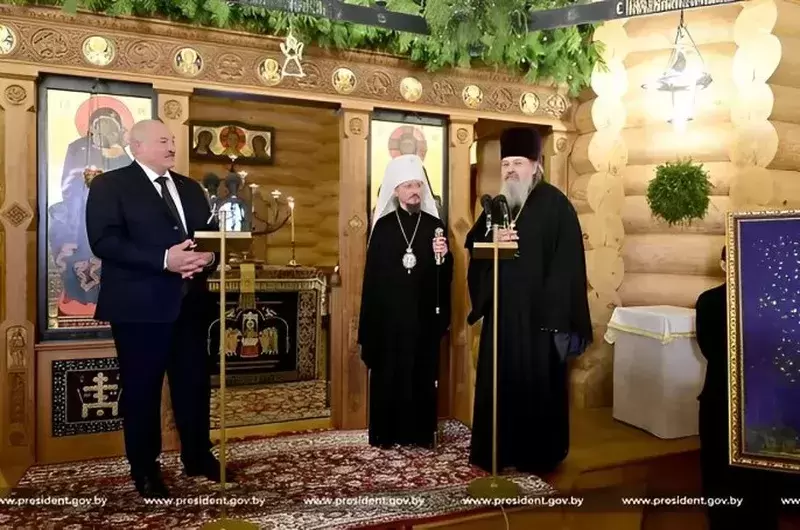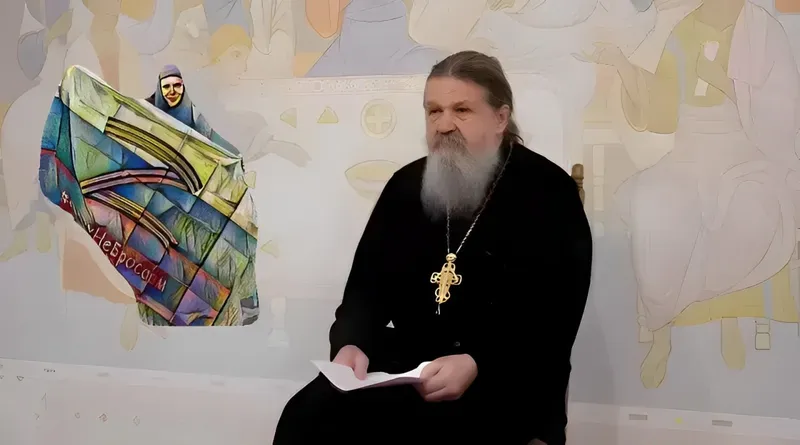
Child Abuse and Religious Manipulation
Section from the Article: Andrei Lemeshonok – Criminal or Saint?
Published 06 December 2024
Sources: [02], [11], [19], [28], [36], [37], [38]
Andrei Lemeshonok and his «Revelations from God»
Andrei Lemeshonok, a controversial figure and self-identified spiritual leader from Belarus, closely associated with the St. Elisabeth Convent in Minsk, has for some years been implicated in a disturbing series of scandals and allegations involving the abuse and exploitation of children under the guise of religious activity.

Men in Black – St. Elisabeth Convent 2023.01.07
He is accused of leveraging his religious authority to propagate a controversial and extremist ideology aligned with «Russian Neo-Nazi» views. These allegations suggest that Lemeshonok exploited his position within the church to oversee and support actions involving the manipulation and mistreatment of vulnerable children. The fallout has cast an ominous light on Lemeshonok, as well as the Abbess, the nuns, and the institution itself, prompting questions about how power, faith, and potential abuse intersect within certain religious circles.
Critics have highlighted the alleged climate of suppression under Lemeshonok’s influence, where dissent is reportedly persecuted and silenced. According to insiders, Andrei Lemeshonok’s reliance on his self-declared «Revelations from God» to justify decisions across spiritual, organizational, economic, and financial matters within the convent is particularly troubling. These revelations have become, in his words, divinely inspired mandates that supersede dialogue or opposition, leading concerned individuals to appeal for a thorough evaluation of his conduct (source [36:1]).
WHY and WHO is relocating UKRAINIAN children to BELARUS – Buromedia.io
Adding to the concerns surrounding the convent, a recent documentary, «WHO and WHY is abducted children from Ukraine relocated to Belarus», offers a chilling perspective on the alleged trafficking and exploitation of Ukrainian children. The documentary with English subtitles investigates claims of inhumane relocation efforts, suggesting that this system operates under the guise of humanitarian aid but may ultimately serve hidden, exploitative agendas.
Another documentary in English, describes the criminal negligence of Andrei Lemeshonok and the Abbess trying to cover up the Corona Virus Pandemic in 2020 at the St. Elisabeth Monastery in Minsk. Their business-as-usual approach is mind-blowing and clearly shows that they were more concerned about the earnings of the Monastery than the health and lives of the people.
The St. Elisabeth Monastery Scandal – YouTube
Russian journalist Marina Akhmedova has highlighted troubling conditions within the St. Elisabeth Convent in Minsk in a Facebook post. She was approached by three nuns from the convent who expressed serious concerns about its leadership, specifically Andrei Lemeshonok and the Abbess. «Everything is a Lie», the nuns reportedly stated, presenting a starkly different account from the one promoted by the convent’s leaders. They claimed that Lemeshonok and the Abbess were misleading the public and the community while the convent struggled with widespread health issues, with nearly 100 of the 130 sisters allegedly infected.
Akhmedova recounted receiving an unexpected call from an unfamiliar female voice, described as «hoarse, as if from fever», sharing urgent details about the convent’s inner workings. According to the journalist, the three nuns painted a grim picture of life within the convent, expressing fears about ongoing misrepresentations and the adverse conditions many sisters endured. Their testimony adds to growing concerns about the practices and governance of the St. Elisabeth Convent (source [38:1]).
Together, these accusations against Lemeshonok, the St. Elisabeth Convent, and broader ROC policies underscore significant concerns regarding the wielding of religious authority for ideological, political, and financial gain, and they call for a deeper examination of accountability within religious institutions (source [36:1]).
The situation reflects wider tensions within the Russian Orthodox Church (ROC) and its powerful network, known internationally for its historical ties to intelligence agencies like the FSB (formerly KGB) and its consistent denial of autonomy for sovereign nations outside the «Russian World». Critics accuse the ROC of fostering a chauvinistic, Neo-Nazi ideology that disregards LGBTQ + rights, promotes COVID-19 misinformation, and holds an exclusionary stance toward other religious communities and denominations (source [28:1]).
KGB Past, Church’s Billions and War | Patriarch Kirill explained
The Russian Orthodox Church and its love of nuclear Bombs – Ua.boell.org
Not content with influence only in Russia, the ROC has long sought to dominate Orthodox churches in former Soviet territories, effectively positioning itself as a «mother church» and imposing its doctrines and practices beyond Russia’s borders (source [28:2]).
Conclusione
The allegations against Andrei Lemeshonok and the St. Elisabeth Convent raise profound questions about the misuse of religious authority and the interplay between faith, power, and exploitation. From accusations of child abuse and ideological extremism to the suppression of dissent and mishandling of critical health crises, the claims paint a troubling picture of an institution straying far from its spiritual mission.
These revelations not only cast a shadow over Lemeshonok’s leadership but also highlight broader systemic concerns within the Russian Orthodox Church (ROC), which faces criticism for leveraging religious influence to further political, ideological, and financial agendas. The documented cases of exploitation, misinformation, and resistance to transparency underscore an urgent need for independent investigation and accountability.
This situation is emblematic of wider tensions within the ROC and its role in promoting controversial policies and ideologies across former Soviet territories. Such practices challenge the ethical foundations of religious institutions and call for greater scrutiny to ensure that faith is not exploited for personal or political gain, but instead serves the spiritual and moral needs of communities it purports to guide.
Author:
Leon (Nic. Cheropoulos)
2024.12.20

